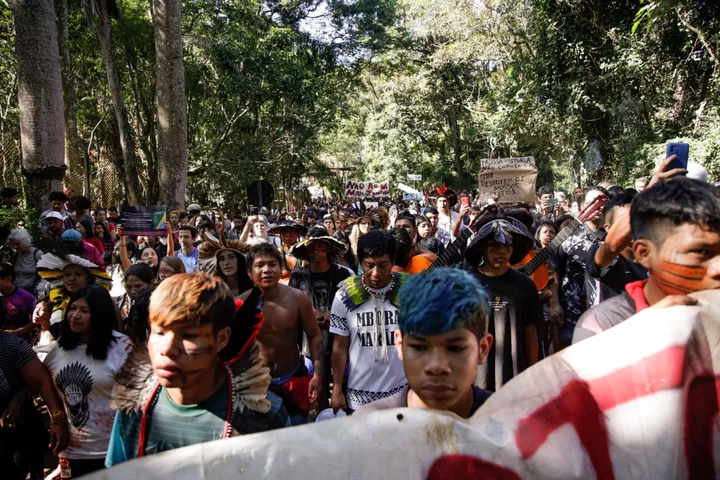Brazil’s Supreme Court rejected an attempt to limit the creation of new Indigenous territories, a boost for President Luiz Inacio Lula da Silva and the tribal communities he pledged to protect.
The court’s justices on Thursday ruled 9-2 against a legal effort that tribal leaders said would have curbed their ability to reclaim traditional lands, while also increasing threats to their communities and the environment.
The ruling will hand Lula a victory in the midst of a series of international events — including the United Nations General Assembly, which began Tuesday in New York — that he is using to push for global funding for his fight to protect the Amazon rainforest.
“This result defines the future of demarcations of Indigenous lands in Brazil,” Minister of Indigenous Peoples Sonia Guajajara said in a statement. “So let’s celebrate the result of the great strength of Brazil’s Indigenous peoples.”
The case involved a legal interpretation of the section of Brazil’s 1988 constitution that established a right for Indigenous tribes to claim lands they traditionally occupied. The so-called Marco Temporal theory would have limited tribal claims to territories they were occupying or legally disputing on the day the constitution was ratified.
“It is necessary to clearly recognize Indigenous rights, and forbid any setback that reduces the constitutional protection of them,” Judge Cristiano Zanin, a Lula appointee who voted against the proposed limits, said during an earlier session.
Brazil’s influential agribusiness sector and other industries have supported the effort. But tribal leaders and human rights groups pointed to the fact that many Indigenous peoples were forced from their territories to argue against a change they said would lead to more mining, farming and logging on those lands.
It “would be an inconceivable setback, would violate human rights, and would signal that Brazil is not living up to its commitments to protect the communities that are proven to best protect our forests,” Maria Laura Canineu, the Brazil director for Human Rights Watch, said in a May statement, as the judicial case proceeded and congress weighed legislation to codify the theory into law.
The years-long legal fight unfolded against a backdrop of intensifying disputes over Indigenous lands, especially under former President Jair Bolsonaro.
The right-wing leader, who promised not to demarcate any new tribal territories during his time in office, oversaw rising rates of deforestation in the Amazon region. His government also faced allegations of retaliation against employees and outside groups that supported the protection of new lands, according to a Human Rights Watch report.
Lula took office in January pledging to protect existing lands and create new territories. But he has faced pushback from Brazil’s conservative congress, which in May removed some powers from the Ministry of Environment.
The lower house also approved the bill that would have made Marco Temporal the law. But the Senate delayed a vote on the measure.
Read More: Brazil Congress Backs Lula’s Cabinet, But Tests Green Agenda
Conservative lawmakers who supported the effort indicated that they will likely push to change the constitution after the court ruling.
The decision “causes concerns” for the agribusiness industry, Marcos Rogerio, the bill’s rapporteur in the Senate, said in a statement. “Congress must give them legal security.”
Lula has in recent months made climate and the environment more central to his agenda both at home and abroad.
His government in August unveiled infrastructure investment programs and other initiatives that he has pitched as the start of a green transition for Brazil’s economy. He also hosted a summit of Amazon nations to discuss strategies for protecting the forest and combating crime in the region.
Lula used that event to ramp up pressure on wealthier nations to deliver on the financial pledges they made to help the developing world combat climate change. He has continued the campaign at the UN summit in New York, where top cabinet officials joined him to pitch investors and other world leaders on the government’s green plans.
Later this year, Lula will travel to Dubai for COP28, the UN’s annual climate summit.
--With assistance from Beatriz Reis.
(Updates with final vote count, comments from Sonia Guajajara and Senator Marcos Rogerio from second paragraph.)

